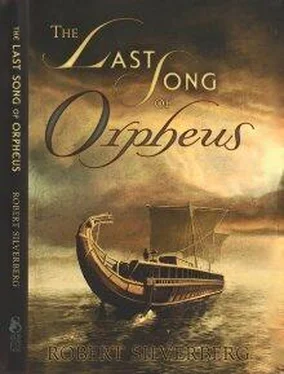The land of the Bithynians, Phineus had told us, lay on our right, but he warned us to make no landing there. We went past it and the mouth of the River Rhebas and the Black Cape and, with our provisions beginning now to run low, we made our first landfall on the little low-lying isle of Thynias to seek meat and fresh water. There Apollo appeared before me in all his divine splendor, golden hair streaming in the wind, his silver bow in his left hand and the ground atremble beneath his feet as he strode by, and I built an altar in his honor and sacrificed a wild goat to him, and pledged myself anew to his service.
Beyond there we traveled awhile without going ashore, but when we drew near the city of Mariandyne, King Lycus’ land, Jason, feeling fretful and anxious and desirous of diversion and sport, ordered us to put the Argo into its harbor. It was an unlucky choice, one of many that our uneasy captain was destined to make.
There is at Mariandyne an entrance to the Netherworld that no one had ever entered and survived, though Heracles, some years hence, would go down into it and return—a frightful chasm through which the icy waters of the Acheron come bursting to the surface, coating the surrounding rocks with glittering frost. Perhaps it was the cold wind that endlessly blows there from below that brought us ill luck, for at Mariandyne we lost Idmon the Argive, a hot-tempered man but a tireless and valuable one. Idmon had some gift as a soothsayer, and had dreamed, the night before, a dream that seemed to foretell his death; but nevertheless he took part in a boar-hunt the next morning, and as he passed beside a reedy meadow a great white-tusked boar sprang up from the side of a stream and gored him in the thigh, so that a fountain of blood spurted from it. Peleus and Idas carried him back to the ship, but he died in their arms before they reached it.
Even while we were still mourning for Idmon we suffered an even more grievous loss, a true catastrophe. In the family of Tiphys the helmsman it was a tradition that no man could live longer than the age of nine and forty years, for there was a curse on his line: Tiphys’ grandfather had been imprudent enough once to cut down a sacred oak, and forty-nine was the number of the years that that oak had lived before it was felled. Tiphys now had reached the same age, and had known from the start of the voyage that he would not survive it. In Mariandyne he fell ill and wasted quickly away, despite the efforts of those among us who understood the medicinal arts; for the most efficacious medicines in the world are helpless against the inescapable decrees that shape our fates.
So Tiphys the irreplaceable was lost, and it was our task to replace him. Jason looked to those sons of the sea-lord Poseidon who were in our midst, of course, Nauplius of Argos, Erginus of Miletus, Melampus of Pylos, and Ancaeus of Tegea, and for a time we debated their various merits among ourselves. In the end Jason gave the nod to Ancaeus, whose strength and courage in time of crisis were beyond debate. And indeed he served us well throughout the remainder of the voyage, though no man could ever have matched Tiphys in his guileful mastery of the sea. After twelve unhappy days in Mariandyne we took to the water once more.
The wind was strong behind us and our oarsmen enjoyed a holiday as the breezes carried us along. To Sinope in Paphlagonia we went, where Jason recruited the brothers Deileon, Autolycus, and Phlogius to fill three of the empty seats on our benches, and then past the river called the Thermodon, that has only four branches short of a hundred, and amidst whose headlands the Amazon women are said to dwell, and after that to the land of the Chalybes, who dig iron from the ground and refine it in an everlasting cloud of black smoke to sell to neighboring tribes. Phineus had advised us to halt next at the Isle of Ares, which we found to be a place infested by huge swarms of such fierce predatory birds that we had to drive them off by pounding on our helmets and shouting with all our might. This we did, and the birds fled, but we wondered why Phineus had told us to put in at this inhospitable site. Soon we had our answer when we came upon four castaways, who said they were brothers, the sons of Phrixus, he who had been carried to Colchis on the back of the ram that bore the fleece of gold. They had been shipwrecked here, they said, while attempting to return from unfriendly Colchis to the land of their grandfather Athamas in distant Thessaly.
Jason, greatly surprised, let them know that he was the grandson of Athamas’ brother Cretheus, and therefore he and they were cousins. He explained that we were even then en route to Colchis to bring home not only the Golden Fleece but the troubled wandering spirit of his uncle Phrixus, their father; and we took them aboard to swell our number.
Now our goal was within reach. Nightfall brought us to an island called Philyra, which had its name because the centaur Cheiron was engendered there long ago by Cronos, king of the Titans, deceiving his wife the goddess Rhea with Philyra, the daughter of Ocean. Cronos, surprised by Rhea in the very act, transformed himself into a stallion and went galloping away, leaving Philyra impregnated with a strange creature that took on half the form of the stallion itself. Or so the story goes. I have never asked Cheiron about the truth of it. At any rate, we passed Philyra and several countries upwater from it, traveling now at great speed before a friendly wind, and saw the lofty peaks of the Caucasus before us, where the Titan Prometheus was chained after his defiance of Zeus and suffers the eternal torment of having an eagle gnaw at his liver, and then the Euxine came to its end.
In front of us now was the mouth of the broad swift-flowing river called the Phasis, which is the river that waters Colchis. We wept with joy, knowing that our quest was nearly done. Jason poured out a libation of wine and honey in gratitude to the gods who had carried us this far, and then up the river we sailed, until the city of Aea, capital of the land of Colchis, lay before us on the left. On our right was the sacred grove of great close-ranked trees where the serpent-guarded Golden Fleece was hanging, as it had hung since the arrival of Phrixus in Colchis, on the branches of a leafy oak. It was the fiftieth day since we had set sail from Pasagae.
Of our arrival in Colchis, of Jason’s involvement with the witch Medea, and of our theft of the Golden Fleece itself, I will try to make a brief telling, since the tale is all so familiar. You will already know how cautious Jason decided not to approach King Aietes at once, for the sons of Phrixus had advised him that Aietes was a dark-souled, dangerous man. Instead Jason ordered us to put the Argo into a sheltered marshy backwater while we discussed the strategy he had in mind. And so we lowered and stowed the sail and yard, and unstepped the mast and lay it beside them, and amidst that reedy, stinking, sweltering marsh we came together in council to hear our captain’s plan.
Trying to seize the wondrous Fleece by force was obviously impossible. It would be just a sparse handful of us against a whole city. What Jason proposed to do was to take the same simple, straightforward approach with Aietes that he had taken in Iolcus that time when, placing his trust in the gods, he went before his usurping uncle Pelias and asked that he restore the rightful king Aeson to his throne. He meant now to go to Aietes and request that the Fleece be given to him as a sign of favor, because he was the kinsman of Phrixus who had brought the Fleece to Colchis in the first place and an oracle had foretold that it was his destiny to return the Fleece to the land of Phrixus’ people.
It was a simple plan indeed, too simple, and there was no reason why it should succeed. Hera, Jason’s patron goddess, had indeed caused Pelias to greet Jason pleasantly and pretend to accede to his request, but then Pelias had sent him off on this voyage, where he might have lost his life a hundred times. Aietes, I knew, would do the same. To me, for whom the future is an aspect of the past and the present is an eternal reality, the outcome was clear: Jason would gain the Fleece, yes, but not in the easy way he hoped for. But I kept silent and the men voted their approval of Jason’s scheme without hesitation.
Читать дальше












